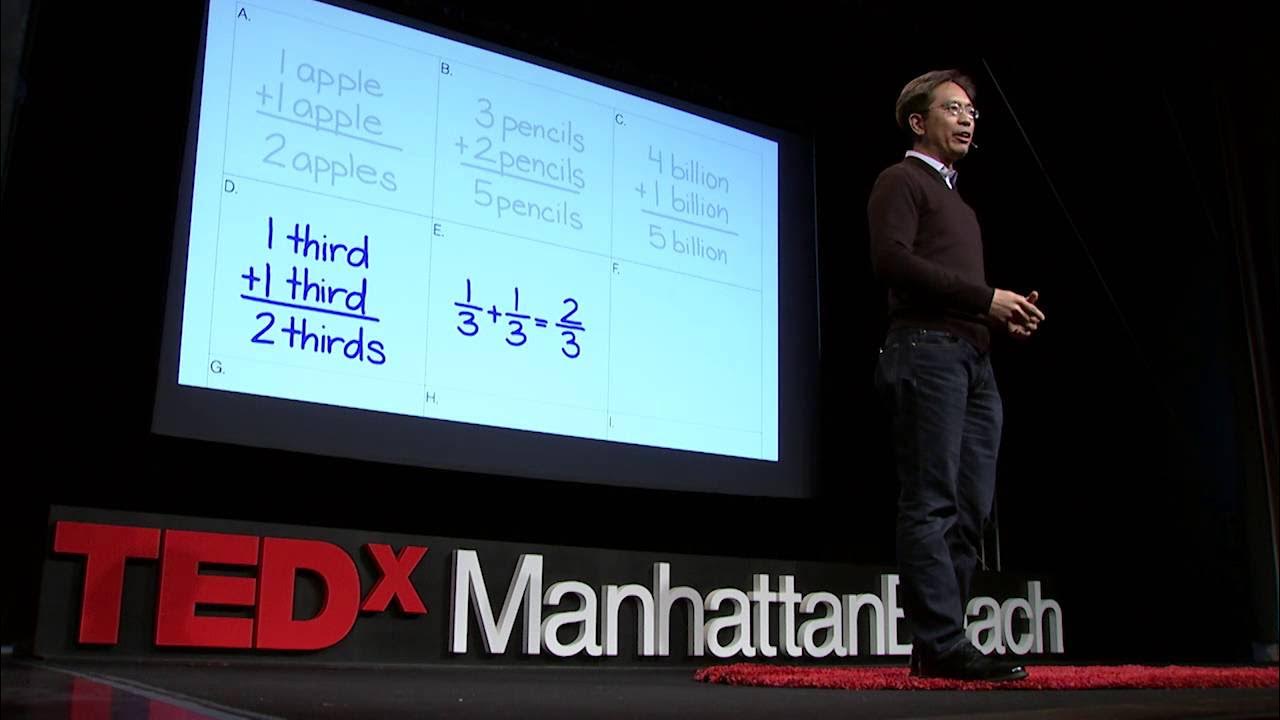The joy of abstract mathematical thinking - with Eugenia Cheng
TLDRThe speaker, a mathematician, shares her enthusiasm for category theory and abstract mathematical thinking at the Royal Institution. She emphasizes the joy of abstraction over its utility, arguing that math's true value lies in its ability to provide clarity and nuance. The speaker recounts her early experiences with math and how category theory later helped her understand previous mathematical concepts. She explains that category theory focuses on relationships between mathematical objects rather than their intrinsic properties, which is a more natural way of thinking in mathematics. The speaker also illustrates how abstract thinking can be applied to everyday situations, using the example of a jacket that fits into a pocket in a non-intuitive way. She concludes by advocating for a more inclusive approach to learning math, where understanding and enjoyment are prioritized over rigid, sequential learning.
Takeaways
- 🎓 The importance of abstract thinking in mathematics is emphasized, as it can be applied broadly to various aspects of life and problem-solving.
- 📚 The speaker's personal journey with mathematics began with attending Royal Institution master classes, which were pivotal in their development as a mathematician.
- 🤖 At the MARS Conference, the speaker demonstrated the practical use of abstract mathematical thinking by figuring out how to fit a jacket into a small pocket, which stumped others.
- 🧵 Category theory, a branch of mathematics, is introduced as a way of making connections between different ideas and understanding structures rather than just solving problems.
- 🌐 Category theory is described as being about relationships and context, asserting that there is no absolute truth, only truth relative to context.
- 📉 The traditional model of math learning is critiqued for being a series of increasingly difficult hurdles, which the speaker argues is a flawed perspective that unnecessarily excludes many people from engaging with math.
- 🔢 The concept of abstraction in mathematics is tied to the idea of analogies and finding similarities between seemingly different situations or problems.
- 📏 The use of letters in math (e.g., a + b) is explained as a form of abstraction that allows for a higher level of generalization and inclusion of more examples.
- 📈 The speaker argues for teaching abstract concepts like category theory earlier in education, as it can provide a unifying perspective that helps understand various areas of mathematics.
- 🌈 Abstraction levels in math are compared to different social situations, where context can change the character or understanding of a concept or person.
- 📝 The script concludes by highlighting the joy and fun the speaker finds in abstract mathematical thinking, advocating for a more inclusive and context-focused approach to mathematics.
Q & A
What is the main theme of the speaker's book 'The Joy of Abstraction'?
-The main theme of the book is to emphasize the joy and the importance of abstraction in mathematics, not just its technical details, formality, or difficulty. The speaker aims to convey that abstraction can be both fun and useful in various aspects of life.
Why did the speaker mention their experience at the MARS Conference?
-The speaker mentioned the MARS Conference experience to illustrate a real-world application of abstract mathematical thinking. Despite being surrounded by leading scientists and astronauts, the speaker was able to solve the puzzle of fitting a jacket into its pocket using abstract, topological thinking, showcasing the practicality and fun aspect of abstraction.
What does the speaker criticize about the current approach to teaching mathematics in schools?
-The speaker criticizes the current approach for focusing too much on the utility of mathematics and for teaching content that lacks relevance to students' daily lives. This can lead to students finding school math neither fun nor useful. The speaker also points out the constraints teachers face due to government policies and standardized testing.
How does the speaker feel about the traditional model of mathematics learning?
-The speaker feels that the traditional model, which is often presented as a series of increasingly difficult hurdles, is flawed. They argue that different areas of mathematics do not necessarily depend on each other and that this model focuses on filtering people out rather than including them.
What is the speaker's view on the usefulness of abstract mathematical thinking?
-The speaker believes that abstract mathematical thinking is useful in daily life, even if specific mathematical concepts like trigonometry are not directly applied. The abstract thinking process can be widely applied to various situations and helps in understanding the world in a broader sense.
What is the speaker's perspective on the role of context in understanding truths?
-The speaker asserts that there is no absolute truth and that all truths are relative to context. They emphasize the importance of putting things in context to understand them better, which aligns with the principles of category theory.
How does category theory contribute to the understanding of the world around us?
-Category theory contributes by focusing on relationships between things rather than their intrinsic characteristics. It allows us to understand structures and how things work by making connections between seemingly unrelated ideas, thus providing a nuanced perspective on the world.
What is the significance of the speaker's experience teaching art students category theory?
-The speaker's experience teaching art students demonstrates that category theory can be accessible and engaging even to those who have had negative experiences with traditional math education. It shows that abstract thinking and category theory can be related to diverse interests and can help students see math in a new light.
Why does the speaker argue that category theory should not be seen as a very advanced piece of mathematics only for the select few?
-The speaker argues that category theory should not be seen as exclusive because it does not depend on other areas of mathematics like calculus or topology. They believe that the interconnected nature of mathematical ideas means that everyone can find a path through mathematics that suits them, and category theory can be a part of that journey for some.
How does the speaker use the concept of a circle to explain different levels of abstraction?
-The speaker uses the concept of a circle to illustrate how abstraction works at different levels. They compare the traditional Euclidean circle to a 'circle' in a grid-like city where movement is restricted to the grid, resulting in a 'diamond' shape of points that are a fixed distance from the center. This demonstrates how the same concept can be generalized and understood differently based on the context.
What is the role of abstraction in the study of mathematics according to the speaker?
-According to the speaker, abstraction is fundamental to the study of mathematics. It allows mathematicians to find similarities between seemingly different situations, create generalizations, and build structures that help in understanding complex systems. The speaker emphasizes that abstraction is not just about creating complex theories but also about finding the right level of abstraction for understanding a particular concept or problem.
Outlines
🎉 Welcome and Introduction
The speaker begins by expressing gratitude to the audience and the Royal Institution for the invitation to speak. They reflect on their previous virtual appearance during lockdown and appreciate the in-person gathering. The speaker also acknowledges the online participants and thanks the technical crew. They mention their early connection with the Royal Institution through master classes and how it influenced their journey as a mathematician. The talk is set to focus on the joy of abstraction, as highlighted in the speaker's book, 'The Joy of Abstraction,' and the importance of abstract thinking in daily life.
🧮 The Utility and Enjoyment of Abstract Mathematics
The speaker discusses the common emphasis on the utility of mathematics and argues for a broader perspective that includes enjoyment and the development of abstract thinking skills. They critique the focus on boring tests in schools and the resulting negative impact on students' perception of math. The speaker uses a personal anecdote involving a jacket at the MARS Conference to illustrate the practical and fun aspects of abstract mathematical thinking. They emphasize that abstract thinking is widely applicable and often more relevant to everyday life than specific mathematical knowledge.
🔗 Category Theory and Contextual Relationships
The speaker introduces category theory as a field of research that is highly abstract even by mathematical standards. They explain that category theory is about understanding connections between different ideas and putting things into context. The speaker argues that there is no absolute truth, only relative truths dependent on context. They discuss the importance of relationships in understanding the world and how category theory provides a framework for identifying and discussing nuances. The speaker also highlights the role of category theory in fostering more nuanced and less polarized discourse.
🤔 Challenging Traditional Mathematics Education
The speaker challenges the traditional view of mathematics learning as a linear progression of increasingly difficult hurdles. They argue that different areas of mathematics do not necessarily depend on one another and that category theory can be understood independently of other mathematical fields. The speaker advocates for a more inclusive approach to mathematics education that does not filter people out based on their ability to overcome each successive hurdle. They propose a web-like model where everything is connected and accessible via various paths.
📚 Teaching Category Theory to Art Students
The speaker shares their experience teaching category theory to art students, who typically had negative experiences with mathematics in the past. Despite lacking traditional mathematical background knowledge, these students were successful in learning category theory because they appreciated abstract thinking and enjoyed finding different perspectives on problems. The speaker emphasizes the importance of teaching abstraction and analogy in mathematics, arguing that these skills are inherent and can be developed in students of all backgrounds.
🔄 Levels of Abstraction and the Importance of Flexibility
The speaker delves into the concept of levels of abstraction, using mathematical expressions as examples to illustrate how abstraction can include or exclude certain elements based on the level of generality. They highlight the importance of finding a good level of abstraction for understanding a particular concept and maintaining the ability to move between levels. The speaker also discusses the role of binary operations in abstraction and how these operations can be generalized to study a wide range of mathematical structures.
🤓 Abstraction in Everyday Arguments and Discussions
The speaker discusses how abstraction can be used to clarify disagreements and facilitate more productive discussions. They use the analogy of COVID-19 and seasonal flu to demonstrate how understanding the level of abstraction can lead to a more nuanced perspective. The speaker also touches on the concept of metrics, explaining how different metrics can be applied to measure various aspects of life, such as the obstacles overcome by individuals, rather than just the distance traveled.
📏 The Geometry of Numbers and Factors
The speaker explores the geometric representation of numbers and their factors, particularly focusing on the structure created by prime factors and their multiples. They use the example of the number 30 to illustrate how factors can be visualized as a cube, with each layer representing a different level of factorization. This geometric approach to numbers helps to reveal the underlying structure and relationships between different mathematical elements.
🏛️ The Power of Visual Abstraction in Understanding Complex Concepts
The speaker explains how visual abstraction through diagrams can make complex mathematical structures more understandable. They discuss how these visual representations can be applied to various situations beyond pure mathematics, such as analyzing social hierarchies or wealth distribution. The speaker also touches on the concept of enriched categories in category theory, which allows for a continuum of elements rather than a simple hierarchy.
🧵 Braids, Dimensions, and the Intuition of Commutativity
The speaker uses the example of braiding hair to illustrate the concept of commutativity and the importance of direction in understanding mathematical operations. They explain how the ability to slide elements around each other and change perspectives is a higher-dimensional concept that can be taught even to young children. The speaker emphasizes the nuance that additional dimensions can provide in understanding complex mathematical and real-world scenarios.
🌟 The Joy and Utility of Abstraction
In conclusion, the speaker reflects on the joy they find in category theory and the importance of abstraction in mathematics. They argue that while the utility of mathematics is important, the enjoyment and satisfaction derived from understanding abstract concepts should not be overlooked. The speaker shares their hope to spread the joy of abstraction to others and encourages a perspective that values relationships and context over intrinsic characteristics.
Mindmap
Keywords
💡Abstraction
💡Category Theory
💡Mathematical Thinking
💡Royal Institution
💡Lockdown
💡Education Policy
💡Trigonometry
💡MARS Conference
💡AI and Language Understanding
💡Nuance
💡Power Set
Highlights
The speaker expresses gratitude for being invited back to the Royal Institution, indicating a positive experience from the previous engagement.
The importance of abstract mathematical thinking is emphasized, as it is used in daily life, contrary to common perceptions about the utility of school mathematics.
The speaker humorously recounts a personal anecdote involving a jacket that could fit into a pocket, showcasing the practicality of abstract thinking in unusual situations.
The Royal Institution's influence on the speaker's life is acknowledged, highlighting the impact of early mathematical experiences on their career.
The critique of the current education system is presented, particularly the focus on boring tests that may not reflect the true value of mathematics.
The concept of category theory is introduced as a field of research, described as highly abstract even by pure mathematicians' standards.
The speaker argues for a broader view of usefulness in mathematics, suggesting that the development of abstract thinking is more beneficial than specific problem-solving skills.
The idea that mathematics can be a source of joy, not just utility, is a central theme of the talk, with the speaker sharing their personal enthusiasm for the subject.
The speaker proposes a different model for mathematics learning, one that is not linear but rather a web of interconnected concepts that can be explored through various paths.
The limitations and issues with the traditional, hierarchical model of mathematics education are discussed, advocating for a more inclusive approach.
The application of category theory to real-world scenarios, such as understanding privilege and societal structures, is explored, demonstrating the theory's versatility.
The speaker's experience teaching category theory to art students, who typically had negative experiences with math, shows the accessibility of abstract concepts when taught differently.
The importance of abstraction in mathematics is discussed, with the speaker explaining how it allows for the generalization and understanding of patterns across different contexts.
The concept of a 'metric' in mathematics is explained, with examples of how different metrics can change the perception of distance, cost, or effort in various situations.
The speaker uses the analogy of braiding hair to illustrate the concept of commutativity and higher-dimensional thinking in category theory.
The final message is one of optimism and a call to appreciate the joy and beauty of abstract thinking, as encapsulated in the speaker's book 'The Joy of Abstraction'.
Transcripts
Browse More Related Video

Math isn't hard, it's a language | Randy Palisoc | TEDxManhattanBeach

How abstract mathematics can help us understand the world | Dr Eugenia Cheng | TEDxLondon

From being terrible at math to a quantum physicist - my journey

Five Principles of Extraordinary Math Teaching | Dan Finkel | TEDxRainier

Mathematics and sex | Clio Cresswell | TEDxSydney

Why is algebra so hard? | Emmanuel Schanzer | TEDxBeaconStreet
5.0 / 5 (0 votes)
Thanks for rating: